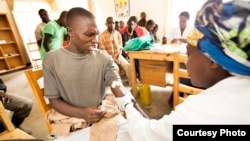WASHINGTON DC —
A Zimbabwe demographic and health survey conducted by the country’s statistics agency in 2010 and 2011, revealed that men between ages 15 and 49, who were circumcised, were slightly more likely to be HIV positive than uncircumcised men.
These results appear to be almost applicable to South Africa and Swaziland, where circumcision programs were implemented in 2009 to reduce the spread of HIV. In most cases, circumcised men are believed to be engaging in unsafe sex.
Despite these findings, HIV/AIDS expert Professor Gabriel Anabwani, says there is no need to conduct further research to prove the effectiveness of circumcision in curbing HIV transmission.
“All the three research projects showed that male circumcision on its own is more effective than most vaccines. Even if a vaccine for HIV was found today it won’t be as effective as male circumcision.”
Professor Anabwani also says the high HIV prevalence rate in most southern African nations is being fueled by lack of circumcision.
“In countries where every male is circumcised the HIV rate is low. The reason why HIV is highest in southern Africa is due to lack of male circumcision,” he says.
Doctor Owen Mugurungi, head of Zimbabwe’s AIDS and Tuberculosis Unit, agrees, noting that male circumcision plays a key role in curbing HIV transmission.
However, Mugurungi is concerned that large numbers of circumcised men are engaging in promiscuous behavior.
For Tatiana Shomiliana, head of the United Nations Joint Program on HIV/AIDS -- or UNIAIDS in Zimbabwe, this is a cause for serious concern as funds for voluntary male circumcision also remain largely untapped.
The situation is the same in Swaziland and South Africa where HIV/AIDS and tuberculosis expert, Pilca Ustero, says there is general lack of education on HIV prevention under the 2009 voluntary male circumcision programs.
“The problem is that it has been shown to be effective in studies, sometimes in reality it’s different. There are a lot of misbeliefs about circumcision,” says Ustero.
Urologist Hassan Ashmawy of Zimbabwe shares the same sentiments, noting that male circumcision should be encouraged in all communities.
“There is a lot of wrong misinformation about this program. I want to inform the public that foreskins have nothing to do with fertility or power of the organ.”
But former lawmaker Felix Magalela Mafa, who opposed the program when it was introduced in Zimbabwe, still insists that circumcision should be abandoned as it has failed to achieve set goals.
“This program appears to be now promoting promiscuity as some circumcised men believe that they can now have sex without condoms. This is the reason why I think it should be abandoned.”
But Professor Anabwani says this will never happen because such programs have been successful in Kenya’s Kisumu region.
“I have absolutely no reason to doubt that it is working well. It has been done for example in that region where the drive to have men circumcised came from within and this is the most successful circumcision program in east and southern Africa,” he says.
The situation remains bleak in these countries, as HIV/AIDS is devastating communities where millions of aids orphans need care.
Some of the institutions helping orphans, such as the Baylor International Pediatric AIDS Initiative, are struggling to cope with such a large number of orphans.
Michael Mizwa, of the Baylor College says they are currently looking after 185,000 affected children.
“We are the largest pediatric HIV provider as far as care and treatment in the world is concerned. We care for the entire family,” says Mizwa.
There is still hope that HIV/AIDS will be brought to manageable levels in Zimbabwe, South Africa and Zimbabwe, though orphan centers are now overwhelmed by children with tuberculosis and other diseases related to AIDS.
It remains unclear whether the voluntary medical circumcision program in these African nations is the answer to the HIV/AIDS in Africa and beyond.
These results appear to be almost applicable to South Africa and Swaziland, where circumcision programs were implemented in 2009 to reduce the spread of HIV. In most cases, circumcised men are believed to be engaging in unsafe sex.
Despite these findings, HIV/AIDS expert Professor Gabriel Anabwani, says there is no need to conduct further research to prove the effectiveness of circumcision in curbing HIV transmission.
“All the three research projects showed that male circumcision on its own is more effective than most vaccines. Even if a vaccine for HIV was found today it won’t be as effective as male circumcision.”
Professor Anabwani also says the high HIV prevalence rate in most southern African nations is being fueled by lack of circumcision.
“In countries where every male is circumcised the HIV rate is low. The reason why HIV is highest in southern Africa is due to lack of male circumcision,” he says.
Doctor Owen Mugurungi, head of Zimbabwe’s AIDS and Tuberculosis Unit, agrees, noting that male circumcision plays a key role in curbing HIV transmission.
However, Mugurungi is concerned that large numbers of circumcised men are engaging in promiscuous behavior.
For Tatiana Shomiliana, head of the United Nations Joint Program on HIV/AIDS -- or UNIAIDS in Zimbabwe, this is a cause for serious concern as funds for voluntary male circumcision also remain largely untapped.
The situation is the same in Swaziland and South Africa where HIV/AIDS and tuberculosis expert, Pilca Ustero, says there is general lack of education on HIV prevention under the 2009 voluntary male circumcision programs.
“The problem is that it has been shown to be effective in studies, sometimes in reality it’s different. There are a lot of misbeliefs about circumcision,” says Ustero.
Urologist Hassan Ashmawy of Zimbabwe shares the same sentiments, noting that male circumcision should be encouraged in all communities.
“There is a lot of wrong misinformation about this program. I want to inform the public that foreskins have nothing to do with fertility or power of the organ.”
But former lawmaker Felix Magalela Mafa, who opposed the program when it was introduced in Zimbabwe, still insists that circumcision should be abandoned as it has failed to achieve set goals.
“This program appears to be now promoting promiscuity as some circumcised men believe that they can now have sex without condoms. This is the reason why I think it should be abandoned.”
But Professor Anabwani says this will never happen because such programs have been successful in Kenya’s Kisumu region.
“I have absolutely no reason to doubt that it is working well. It has been done for example in that region where the drive to have men circumcised came from within and this is the most successful circumcision program in east and southern Africa,” he says.
The situation remains bleak in these countries, as HIV/AIDS is devastating communities where millions of aids orphans need care.
It has developed into a situation that is casting doubt on the effectiveness of circumcision in helping to curb the spread of HIV/AIDS in sub-Saharan Africa"
Michael Mizwa, of the Baylor College says they are currently looking after 185,000 affected children.
“We are the largest pediatric HIV provider as far as care and treatment in the world is concerned. We care for the entire family,” says Mizwa.
There is still hope that HIV/AIDS will be brought to manageable levels in Zimbabwe, South Africa and Zimbabwe, though orphan centers are now overwhelmed by children with tuberculosis and other diseases related to AIDS.
It remains unclear whether the voluntary medical circumcision program in these African nations is the answer to the HIV/AIDS in Africa and beyond.












